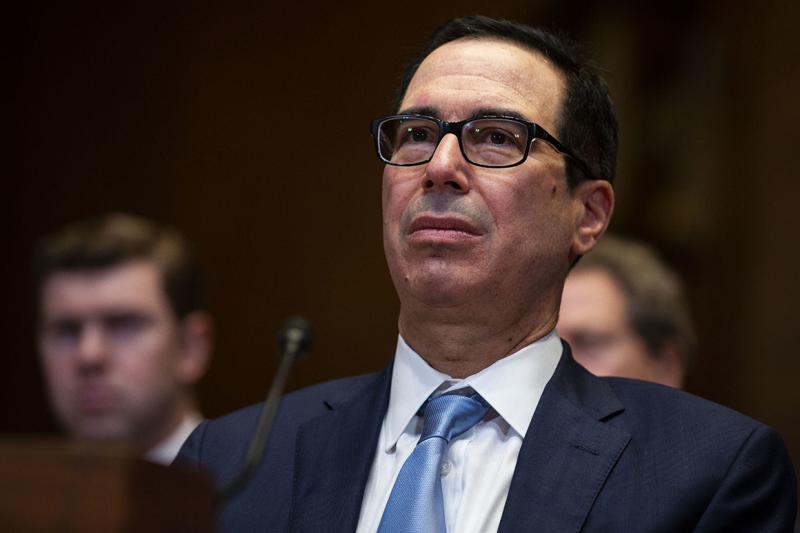Big businesses paying even less than expected under GOP tax law



Federal tax payments by big businesses are falling much faster than anticipated in the wake of Republicans’ tax cuts, providing ammunition to Democrats who are calling for corporate tax increases.
The U.S. Treasury saw a 31 percent drop in corporate tax revenues last year, almost twice the decline official budget forecasters had predicted. Receipts were projected to rebound sharply this year, but so far they’ve only continued to fall, down by almost 9 percent or $11 billion.
Though business profits remain healthy and the economy is strong, total corporate taxes are at the lowest levels seen in more than 50 years.
At the same time, overall taxes paid by individuals under the new tax law are up so far this year by 3 percent, thanks to higher wages and salaries, according to the Congressional Budget Office. Last year tax payments by individuals went up 4 percent.
The drop comes even as some Republicans, such as Treasury Secretary Steven Mnuchin, have claimed, dubiously, that the law will pay for itself.
The revenue decline may fan complaints the law gave too much to big business and provide new fodder for Democrats now trying to roll back the cuts. Sen. Elizabeth Warren, a Democratic presidential candidate, is calling for a dramatic increase in corporate taxes while House Ways and Means Chairman Richard Neal (D-Mass.) has proposed hiking the corporate rate by a percentage point to help pay for expanded breaks for low- and middle-income people.
Analysts agree they can’t yet explain the decline in corporate tax payments.
They have a host of theories though, such as businesses making wider-than-expected use of the law’s expanded breaks for business investments. It may also be an unexpected side effect of President Donald Trump’s trade wars.
“I don’t think any of us can point to something specific and say this is definitely what’s going on,” said Kyle Pomerleau, chief economist at the Tax Foundation.
Analysts expected corporate payments to fall in the wake of the Tax Cuts and Jobs Act, which slashed the corporate tax rate by 14 percentage points, to 21 percent, and expanded breaks for buying machinery and equipment.
In April 2018, less than four months after the cuts were signed into law, the nonpartisan CBO predicted corporate receipts would drop that year to $243 billion, which would have been an 18 percent decline from 2017. But payments ended up coming in at $205 billion, a nearly one-third decline from the previous year.
Then, in January, CBO projected receipts would bounce back this year, increasing by 20 percent or $40 billion. But through last month, they’re down 8.7 percent.
CBO says it isn’t sure what's happening.
“Weakness in corporate tax collections” goes “beyond that which can be explained by currently available data on business activity,” the agency says.
One reason, CBO says, could be that companies shifted deductible expenses — like funding for their workers’ pensions — into 2017, when the corporate rate was still 35 percent, because that made those deductions worth more. That would still show up in the government’s data for the 2018 fiscal year, which began in October 2017. The agency doesn’t know the extent to which that might be happening.
Other analysts see other possibilities.
Companies may be making greater use of so-called expensing, an incentive that allows them to immediately write off the cost of investments rather than having to stagger them over a number of years. Having more stuff to deduct means smaller tax bills. If that’s the case, it could mean receipts will rebound in coming years because companies will not have those write-offs available to them in the future.
Another potential explanation: Trump’s tariffs, which could hurt corporate tax revenues in two ways. If a U.S. company that relies on components made in China suddenly sees the cost of those items increase, it will have more to deduct as business expenses. Alternatively, if a company is seeing fewer sales because it is passing along the cost of the tariffs to its customers, it will have fewer profits to tax.
“You either reduce business receipts or increase deductible costs, and either of those things reduce corporate taxable income,” said Pomerleau. “It may mean corporate tax liability is lower than we expected not because our projections of the TCJA were wrong, but maybe because we didn’t account for the fact that tariffs were going to lower corporate receipts.”
A fourth possible factor: The law isn’t reducing profit shifting by multinational corporations as much as forecasters expected. By cutting the corporate rate, the Tax Cuts and Jobs Act was supposed to reduce the incentive for companies operating in multiple countries to stockpile profits abroad, out of the reach of the IRS.
Overall corporate revenues last year amounted to 1 percent of GDP, a level they’ve dipped to only twice since 1965. Both of those previous instances, in 2009 and 1983, came in the wake of recessions, when business profits had cratered.
By BRIAN FALER
Photo: The drop in tax payments comes even as some Republicans, such as Treasury Secretary Steven Mnuchin, have claimed that the law will pay for itself. | Anna Moneymaker/Getty Images








It seems like they are trying to come up with every excuse in the book.
Same thing every time, "I will lower your taxes!!!!", and every time, the middle class republicans buy it, even though it has yet to ever come true.
Hell, I am still waiting for that 10% tax cut trump promised us 3 days before the mid-terms.
"Analysts agree they can’t yet explain the decline in corporate tax payments."
Kinda says it all.
But people are going to pretend they know what it means anyway.
Best thing EVER !
It makes them "Feel" good.
In May the United States ran the United State's highest monthly budget deficit in the United State's History. When the next recession hits there will be nothing left we can do about it...
We can just hand out money again, just like we did in 2009 !
When it comes to government, it's just paper, and NOT their paper either. What the heck !
Fiscal policy was used to help us out of Bush's Great Recession but that will not be an option for us the next time (probably starting this Fall) because we are already running record deficits due to Trump's and the damn gop's fiscal irresponsibly. Why are we bleeding record setting debt growth in relatively good economic times? Or, doesn't the damn gop even care anymore?
Even Obama admitted there was nothing shovel ready for his generous "Giving" of our money.
Did we get a refund ?
Government Prints Money, they don't earn it !
I don't think the advertised purpose of the tax cut was to raise revenue from corporate payers in the first year. I don't remember seeing that. What I remember is that it was supposed to promote sustained economic growth. So far, that seems to be happening, but it's probably a little soon to say conclusively.
Personally, I don't have a problem with low corporate taxes. I think it makes more sense to tax people based on what they make rather than the company they work for. If business thrives because it doesn't have to pay taxes, it seems to me that would benefit everyone working for the corporation, from the CEO to the newest guy in the mail room.
That's sort of how it's supposed to work. You make more money, you will naturally pay more in taxes. Observing that doesn't say anything about how much money people have in their pockets relative to previous years.
Well pre-Trump corporate tax cut there were dozens of the biggest corporations who paid zero in taxes and the average among all US corporations was 18%. Giving them another $6 trillion over the next 10 years in further tax cuts without closing a single loop hole would inevitably lead to even more companies paying zero in taxes and a lowering of the already ridiculously low average corporate tax rate. Anyone with more than half a brain saw this coming long before the Trump tax cut was ever implemented.